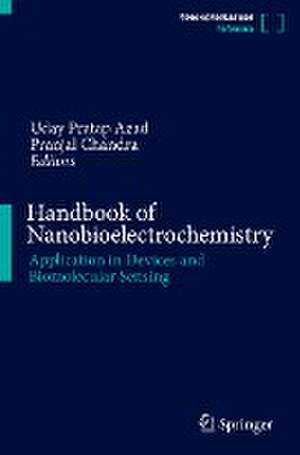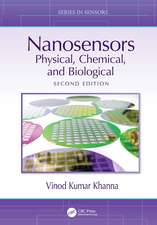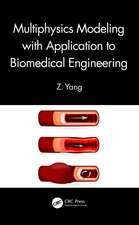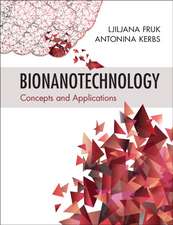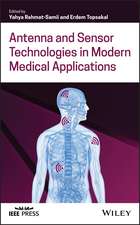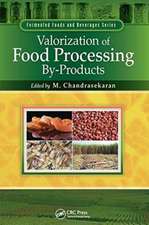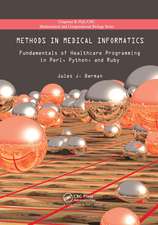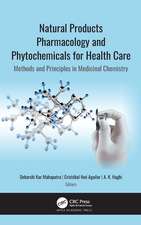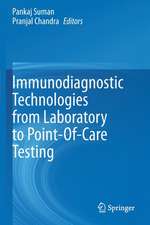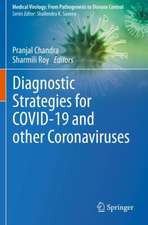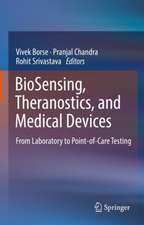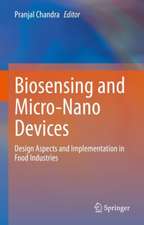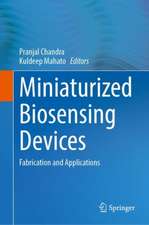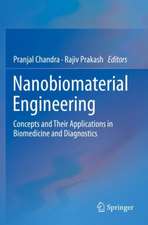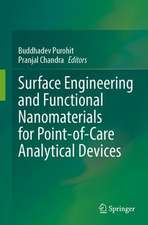Handbook of Nanobioelectrochemistry: Application in Devices and Biomolecular Sensing
Editat de Uday Pratap Azad, Pranjal Chandraen Limba Engleză Hardback – 31 aug 2023
Finally, the book provides an accessible and readable summary of the use of nanomaterial for understanding the electrochemical reaction taking place at nano-bio interfaces in electrochemical biomolecular detection and analysis. The book bridges the gap and strengthens the relationship between electrochemists, material scientists, and biomolecular scientists who are directly or indirectly associated with the field of such point-of-care diagnostics.
Preț: 3877.69 lei
Preț vechi: 4728.90 lei
-18% Nou
Puncte Express: 5817
Preț estimativ în valută:
742.10€ • 771.89$ • 612.64£
742.10€ • 771.89$ • 612.64£
Carte disponibilă
Livrare economică 24 martie-07 aprilie
Preluare comenzi: 021 569.72.76
Specificații
ISBN-13: 9789811994364
ISBN-10: 9811994366
Pagini: 950
Ilustrații: XX, 950 p. 204 illus., 177 illus. in color.
Dimensiuni: 155 x 235 mm
Greutate: 1.77 kg
Ediția:1st ed. 2023
Editura: Springer Nature Singapore
Colecția Springer
Locul publicării:Singapore, Singapore
ISBN-10: 9811994366
Pagini: 950
Ilustrații: XX, 950 p. 204 illus., 177 illus. in color.
Dimensiuni: 155 x 235 mm
Greutate: 1.77 kg
Ediția:1st ed. 2023
Editura: Springer Nature Singapore
Colecția Springer
Locul publicării:Singapore, Singapore
Cuprins
Introduction to Nanobioelectrochemistry. -Nanobiomaterials, classifications, and properties.- Nanobiomaterials for Proteins, Enzymes, and Biosensors.- Nanoparticles modified Ultramicroelectrode and their electroanalytical application.- Nanobiomaterial based biosensors in infectious disease diagnosis.- Nanobiomaterials: Applications in nanomedicine and drug delivery.- Metal nanoclusters in and their composites for clinical diagnosis.- Graphitic carbon nitride in biosensing application.- Nanobiomaterials for Point-of-Care Diagnostics.- Nano-Perovskites Derived Modified Electrodes in Biomolecular Detection.- Nanobiosensors: Construction and diagnosis of diseases.- Nanopaper Based Biosensors for Point of Care Diagnosis.- Nanobiostructured materials for point-of-care diagnostics.- Organic-Inorganic Hybrid Nanomaterials in Biosensing Application.- Nanodendrite a Promising Catalytic Material for Bioanalytical Application.- NanoEnzyme Based Electrodes in Biomolecular Screening and Analysis.- Nanobioelectrochemical Systems in Clinical Diagnosis.- Nanoelectrodes and Nanopores Ensembles for Electrobioanalytical Applications.- Nanomaterial Based Electrochemical Impedance Spectroscopy (EIS): principles and biosensing applications.- Micro-nano structured materials for DNA/RNA amplification-based electrochemical tests.
Notă biografică
Prof. Uday Pratap Azad is currently working as an Assistant Professor at the School of Physical Sciences, Department of Chemistry, Guru Ghasidas Vishwavidyalaya (GGV), Bilaspur, Chhattisgarh, India. He received his B.Sc. M.Sc. and Ph.D. degree from Banaras Hindu University, Varanasi, India. Before joining GGV as Assistant Professor he worked as Post-Doctoral Fellow at Pusan National University and Yonsei University, respectively for over three years. He has also worked as National Post-Doctoral Fellow at IIT(BHU) Varanasi, India. He is the recipient of several prestigious fellowships e.g. President Fellowship (South-Korea), Brain Korean Fellowship (BK-21) South-Korea, and National Post-Doctoral Fellowship (SERB, India). He has expertise in electrochemical sensors, biosensors, Fuel cells, energy storage, electrochemical water splitting, etc. His research interest includes various kinds of nanomaterials, metal complexes, metal oxides, and nanocomposites based Modified electrodes for various electroanalytical applications. He has a better understanding of nano-electrochemistry and associated as a reviewer in more than 30 peer-reviewed international journals. He has more than two years of teaching experience and more than 5 years of research experience excluding the experience gained during Ph.D. tenure. He has also published more than 35 research articles in peer-reviewed international journals.
Prof. Pranjal Chandra is an Associate Professor at the School of Biochemical Engineering, Indian Institute of Technology (BHU), Varanasi, India. He earned his Ph.D. from Pusan National University, South Korea and did post-doctoral training at Technion-Israel Institute of Technology, Israel. His research focus is highly interdisciplinary, spanning a wide range in biotechnology, nanobiosensors, material engineering, and nanomedicine. He has designed several commercially viable biosensing prototypes that can be operated for onsite analysis forbiomedical diagnostics. He is an associate editor / editorial board member of various international journals, including Scientific Reports, Sensors International, Frontiers in Bioengineering and Biotechnology, Molecules, Frontiers in Sensors, and Green Analytical Chemistry. He is an expert member/reviewer of various national and international funding agencies. He has also been appointed as Advisor for the Biomedical Sensors Domain and Sensor Networks Systems at the Institution of Engineering and Technology (IET), Michael Faraday House, LONDON, United Kingdom. Prof. Chandra has authored over 140 high-impact publications, including research/review papers and invited book chapters and published 15 books on biosensors/medical diagnostics / material engineering. He has guided 5 Ph.D. and currently supervising 8 Ph.D. students. Prof. Chandra received many prestigious awards, coveted honors, and fellowships, such as Fellow of the Indian Chemical Society, Shakuntala Amirchand Award 2020 by theIndian Council Of Medical Research, NASI-Prof. B.K. Bachhawat Memorial Young Scientist Lecture Award (2022); FSSAI Eat Right Award-2022 (Government of India); DST Ramanujan fellowship (Government of India); Early Career Research Award (ECRA) (DST, Government of India); BK -21 and NRF fellowship, South Korea; Technion Post-Doctoral Fellowship, Israel; Nano Molecular Society India Young Scientist Award; Biotech Research Society India Young Scientist Award; Young Engineers Award 2018; Highly Cited Corresponding authors in The Royal Society of Chemistry (RSC), Cambridge, London; Top 10% cited article in the General Chemistry Section RSC Journal, Cambridge, London, Gandhian Young Technology Innovation Award (GYTI) 2020, etc. Dr. Chandra is also listed among the world’s top 2% scientists in 2020 and 2021 by Stanford University, USA.
Prof. Pranjal Chandra is an Associate Professor at the School of Biochemical Engineering, Indian Institute of Technology (BHU), Varanasi, India. He earned his Ph.D. from Pusan National University, South Korea and did post-doctoral training at Technion-Israel Institute of Technology, Israel. His research focus is highly interdisciplinary, spanning a wide range in biotechnology, nanobiosensors, material engineering, and nanomedicine. He has designed several commercially viable biosensing prototypes that can be operated for onsite analysis forbiomedical diagnostics. He is an associate editor / editorial board member of various international journals, including Scientific Reports, Sensors International, Frontiers in Bioengineering and Biotechnology, Molecules, Frontiers in Sensors, and Green Analytical Chemistry. He is an expert member/reviewer of various national and international funding agencies. He has also been appointed as Advisor for the Biomedical Sensors Domain and Sensor Networks Systems at the Institution of Engineering and Technology (IET), Michael Faraday House, LONDON, United Kingdom. Prof. Chandra has authored over 140 high-impact publications, including research/review papers and invited book chapters and published 15 books on biosensors/medical diagnostics / material engineering. He has guided 5 Ph.D. and currently supervising 8 Ph.D. students. Prof. Chandra received many prestigious awards, coveted honors, and fellowships, such as Fellow of the Indian Chemical Society, Shakuntala Amirchand Award 2020 by theIndian Council Of Medical Research, NASI-Prof. B.K. Bachhawat Memorial Young Scientist Lecture Award (2022); FSSAI Eat Right Award-2022 (Government of India); DST Ramanujan fellowship (Government of India); Early Career Research Award (ECRA) (DST, Government of India); BK -21 and NRF fellowship, South Korea; Technion Post-Doctoral Fellowship, Israel; Nano Molecular Society India Young Scientist Award; Biotech Research Society India Young Scientist Award; Young Engineers Award 2018; Highly Cited Corresponding authors in The Royal Society of Chemistry (RSC), Cambridge, London; Top 10% cited article in the General Chemistry Section RSC Journal, Cambridge, London, Gandhian Young Technology Innovation Award (GYTI) 2020, etc. Dr. Chandra is also listed among the world’s top 2% scientists in 2020 and 2021 by Stanford University, USA.
Caracteristici
Introduces the concept of nanobioelectrochemical approach for synthesis of nanodevices Presents nanomaterials-based biosensors for the diagnosis of infectious diseases Reviews the diagnostic and therapeutic applications of engineered ultra-small nanoclusters
